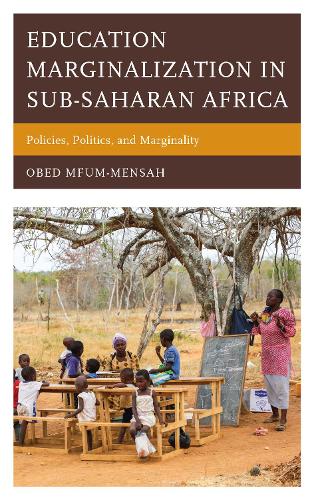
Education Marginalization in Sub-Saharan Africa: Policies, Politics, and Marginality
(Hardback)
Publishing Details
Education Marginalization in Sub-Saharan Africa: Policies, Politics, and Marginality
By (Author) Obed Mfum-Mensah
Bloomsbury Publishing PLC
Lexington Books
15th August 2018
United States
Classifications
Professional and Scholarly
Non Fiction
Education / Educational sciences / Pedagogy
Philosophy and theory of education
Colonialism and imperialism
306.430967
Physical Properties
Hardback
240
Width 159mm, Height 238mm, Spine 22mm
526g
Description
This book focuses on education policy framework for educating marginalized children in sub-Saharan Africa. It uses marginality as a critical discourse to highlight the complicated ways education policy making in sub-Saharan Africa have constructed and perpetuated marginality in the region since Africas encounters with Europe. The book is organized around two parts, each of which discusses a specific dimension of the marginality and education policy nexus. Part I focuses on theorizations of marginality and education. The theoretical framework on marginality and education outlines the definitional and conceptual backgrounds on marginality the complicated ways policies of the Christian missionaries, colonial governments and postcolonial governments constructed and perpetuated marginality in the region. Part II focuses on addressing the issue of marginality from theory to practice. These chapters highlight the ways policies shaped the educational development, schooling processes, and educational outcomes of selected marginalized communities and groups. Attention is given to schooling in rural communities, the complexities of girls education in rural contexts, education of Zongo Muslim communities, violence in school in rural contexts, and education collaboration in rural traditional communities. The book argues that education policies in sub-Saharan Africa fail to address the educational needs of marginalized children because current policy frameworks ae not based on examination of colonial policies which created the existing marginality. In order toimplement policies that address policy gaps and meet the educational needs of marginalized children, strong synergies are necessary between education policy makers, other education stakeholders, and marginalized communities.
Reviews
Mfum-Mensahs text provides a succinct and critical analysis of the impact of colonialism, missionaries, and post-independence education policies on the continued marginalization of children in Sub-Saharan Africa. -- Karen L. Biraimah, University of Central Florida, Orlando
This is a timely contribution to the understanding of the education needs of children and populations in marginalized conditions, capturing policy and practice in context. Anyone seeking to support the realization of the United Nations Sustainable Development Goal 4 (SDG 4) would benefit from reading this book. -- Edith Mukudi Omwami, University of California, Los Angeles
The case of Sub-Saharan African postcolonial education programs serving as socially, culturally, politically, and economically enfranchising platforms, has now been debated for some time. Consistently though, both the descriptive and analytical returns from these discussions have not been encouraging; more often than otherwise, the presence of colonial conceptualizations, theorizations, and attendant practices of this education seem to have stunted the expected outcomes of social well-being and economic advancement. It is indeed, these pressing and problematic realities of African education that make Obed Mfum-Mensahs new book so timely and topically cogent with much needed analyses that locate this education as connected to the ongoing marginalization of people. With its well-connected theoretical perspectives and policy analysis, the book will greatly benefit specialized researchers and students and can serve as an important resource for educational managers and policy makers in Africa and elsewhere. -- Ali A. Abdi, The University of British Columbia
Author Bio
Obed Mfum-Mensah is professor in the Department of Education at Messiah College.
